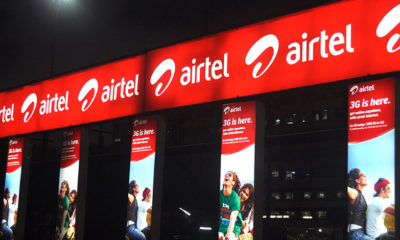- Weak Fundamentals Hurting Airtel from London to Lagos
Airtel Africa, a subsidiary of India’s Bharti Airtel Ltd, has been on the decline since it listed on London Stock Exchange (LSE) and Nigerian Stock Exchange (NSE) as investors seem wary of the fundamental issues affecting the company’s growth.
Unlike its rival in Africa, MTN Group, Airtel Africa has incurred more than $4 billion in debt, yet unable to broaden its coverage to compete effectively with MTN in Africa.
In October 2018, Airtel raised $1.25 billion in an initial round of pre-IPO funding, and in January 2019, another $200 million was raised for expansion.
Similarly, Bharti Airtel Ltd is struggling back home in India with mounting debt and a year-long price war with rivals.
While Airtel group continues to sell its ’14 key operations’ in Africa as the key to future growth, investors are concerned about the instability in emerging economies and lack of reach needed to compete efficiently, especially after what happened to MTN Nigeria in recent years.
Raghunath Mandava, chief executive of the group, said: “The 14 countries where we operate offer strong GDP growth potential and have young and fast-growing populations, low customer and data penetration and inadequate banking infrastructure. These fast-growing markets provide us a great opportunity to grow both our telecom and payments businesses.”
However, a fund manager with Scottish Investment Trust Plc, Ally McKinnon, who said he didn’t participate in the IPO, pointed to the level of vulnerability of telecommunication companies in emerging markets.
According to him, “Once you’ve got the network built, you’re vulnerable because you’ve got assets in the country, you’re a big company that makes money, or makes cash flow at least.”
Another analyst with New Street Research, Alastair Jones, said the company exposure to Nigeria and weaker position compared with rivals is an issue.
“Clearly it’s a more difficult market at the moment for African telcos,” said Jones, who doesn’t have a rating on Airtel, in an interview on Friday. “The regulatory risk around the region is elevated given what has happened with MTN over the last few years.”
Despite been the third most valuable company on the Nigerian Stock Exchange and adding more than N1.3 trillion to the exchange market capitalisation, Airtel Africa has failed to replicate MTN Nigeria success as investors are more concerned about its capability to compete with MTN Nigeria and at the same time sustain it slight edge over Globacom, an indigenous telecom giant in Nigeria.
Again, because Nigeria contributes over 35 percent of its total revenue, Nigeria remains an important market for the company. Therefore, if there is doubt about its ability to scale and compete effectively in Africa’s largest market, investors will remain wary.
Accordingly, Airtel Africa’s poor performance since its debut on the Nigerian Stock Exchange goes beyond current issues hurting the exchange as widely publicized.
Airtel does not have the same appeal as MTN Nigeria, therefore, until its management is able to address investors’ concerns and put out a growth blueprint, we may not see substantial improvement in the stock value in near-term.
Airtel Africa has dropped over 18 percent of its total market value since its debut on the Nigerian stock exchange. Down from N399.3 a share it attained on Tuesday to N323.50 on Friday. Erasing N148 billion from its market value.
Similarly, it has dropped from 80 pence it listed on London Stock Exchange to 72 pence as of Friday.


 Forex3 weeks ago
Forex3 weeks ago
 Naira3 weeks ago
Naira3 weeks ago
 Billionaire Watch3 weeks ago
Billionaire Watch3 weeks ago



 Naira3 weeks ago
Naira3 weeks ago






 Naira3 weeks ago
Naira3 weeks ago




 Naira2 weeks ago
Naira2 weeks ago




 Naira4 weeks ago
Naira4 weeks ago






 Naira2 weeks ago
Naira2 weeks ago

















